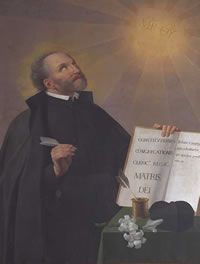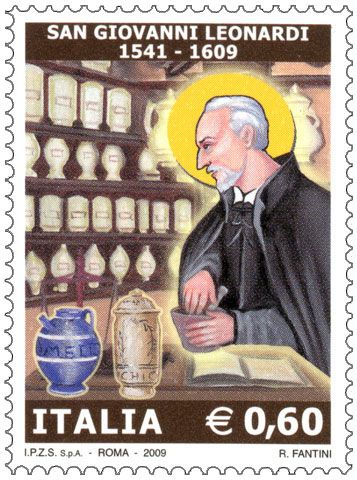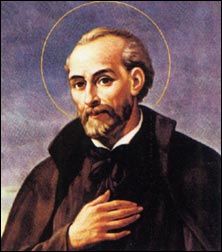Today, October 9, we celebrate the feast day of Saint John Leonardi (1541-1609), founder of the Clerks Regular of the Mother of God of Lucca. This group, through his leadership and example, served those most in need of assistance, including prisoners, the plague-ridden, the poor, and the forgotten. Saint John Leonardi remains a model of Christian charity for us to ascribe to today.
Pope Benedict XVI spoke on Saint John Leonardi during his general address on October 7, 2009. The translation of that address follows:
The day after tomorrow, October 9, will be the 400th anniversary of the death of St. John Leonardi, founder of the religious order of Clerks Regular of the Mother of God, canonized on April 17, 1938, and chosen patron of pharmacists on Aug. 8, 2006. He is also remembered for his great missionary zeal.
Together with Monsignor Juan Bautista Vives and Jesuit Martin de Funes, he planned and contributed to the establishment of a specific Congregation of the Holy See for the missions, that of Propoganda Fide, and to the future birth of the Pontifical Urbanian Athenaeum "De Propoganda Fide," which in the course of centuries has forged thousands of priests, many of them martyrs, to evangelize peoples. We are speaking, therefore, of a luminous priestly figure, which I am pleased to point out as an example to all presbyters in this Year for Priests. He died in 1609 from influenza contracted while he was giving himself to the care of all those who had been stricken by the epidemic in the Roman quarter of Campitelli.
John Leonardi was born in 1541 in Diecimo, in the province of Lucca. The last of seven siblings, his adolescence was sprinkled with rhythms of faith lived in a healthy and industrious family group, as well as the assiduous frequenting of a shop of herbs and medicines in his native town. At age 17 his father enrolled him in a regular course in pharmacy in Lucca, with the aim of making him a future pharmacist, that is, an apothecary, as they were called then. For close to a decade young John Leonardi was vigilant and diligent in following this, but when, according to the norms established by the former Republic of Lucca, he acquired the official recognition that would have allowed him to open his own shop, he began to think if perhaps the moment had not arrived to fulfill a plan that he had always had in his heart.
After mature reflection he decided to direct himself toward the priesthood. And thus, having left the apothecary's pharmacy, and acquired an appropriate theological formation, he was ordained a priest and celebrated his first Mass on the feast of Epiphany of 1572. However, he did not abandon his passion for pharmaceutics because he felt that professional mediation as a pharmacist would allow him to realize fully his vocation of transmitting to men, through a holy life, "the medicine of God," which is Jesus Christ crucified and risen, "measure of all things."
Animated by the conviction that, more than any other thing, all human beings need such medicine, St. John Leonardi tried to make the personal encounter with Jesus Christ the fundamental reason of his existence. It is necessary to "start anew from Christ," he liked to repeat very often.
The primacy of Christ over everything became for him the concrete criterion of judgment and action and the generating principle of his priestly activity, which he exercised while a vast and widespread movement of spiritual renewal was under way in the Church, thanks to the flowering of new religious institutes and the luminous witness of saints such as Charles Borromeo, Philip Neri, Ignatius of Loyola, Joseph Calasanzius, Camillus of Lellis and Aloysius Gonzaga.
He dedicated himself with enthusiasm to the apostolate among youth through the Company of Christian Doctrine, gathering around himself a group of young men with whom, on Sept. 1, 1574, he founded the Congregation of Reformed Priests of the Blessed Virgin, subsequently called the Order of Clerks Regular of the Mother of God. He recommended to his disciples to have "before the mind's eye only the honor, service and glory of Christ Jesus Crucified," and, like a good pharmacist, accustomed to giving out potions according to careful measurements, he would add: "Raise your hearts to God a bit more and measure things with him."
Moved by apostolic zeal, in May 1605 he sent newly elected Pope Paul V a report in which he suggested the criteria for a genuine renewal of the Church. Observing how it is "necessary that those who aspire to the reform of men's practices must seek especially, and firstly, the glory of God," he added that they should stand out "for their integrity of life and excellence of customs thus, rather than constraining, they gently draw one to reform." Moreover, he observed that "whoever wishes to carry out a serious moral and religious reform must make first of all, like a good doctor, a careful diagnosis of the evils that beset the Church so as to be able to prescribe for each of them the most appropriate remedy." And he noted that "the renewal of the Church must be confirmed as much in leaders as in followers, high and low. It must begin from those who command and be extended to the subjects."
It was because of this that, while soliciting the Pope to promote a "universal reform of the Church," he was concerned with the Christian formation of the people, especially of the young, educating them "from their early years ... in the purity of the Christian faith and in holy practices."
Dear brothers and sisters, the luminous figure of this saint invites priests, in the first place, and all Christians, to tend constantly to the "high measure of the Christian life," which is sanctity -- each, of course, according to his own state. In fact, only from fidelity to Christ can genuine ecclesial renewal spring.
In those years, in the cultural and social passage between the 16th and 17th century, the premises of the future contemporary culture began to be delineated, characterized by an undue separation of faith and reason. This has produced among its negative effects the marginalization of God, with the illusion of a possible and total autonomy of man who chooses to live "as if God did not exist." This is the crisis of modern thought, which many times I have had the opportunity to point out and which often leads to a form of relativism.
John Leonardi intuited what the real medicine was for these spiritual evils and he synthesized it in the expression: "Christ first of all," Christ in the center of the heart, in the center of history and of the cosmos. And humanity -- he affirmed forcefully -- needs Christ intensely, because he is our "measure." There is no realm that cannot be touched by his strength; there is no evil that cannot find remedy in him, there is no problem that cannot be solved in him. "Either Christ or nothing!" Here is his prescription for every type of spiritual and social reform.
There is another aspect of the spirituality of St. John Leonardi that I would like to highlight. In many circumstances he had to confirm that a living encounter with Christ is realized in his Church: holy but fragile, rooted in history and in a sometimes dark future, where wheat and weeds grow together (cf. Matthew 13:30), but, nevertheless, always the sacrament of salvation. Having a clear awareness that the Church is the field of God (cf. Matthew 13:24), he was not scandalized by her human weaknesses. To oppose the weeds he chose to be good wheat: He decided, that is, to love Christ in the Church and to contribute to render her an ever more transparent sign of him.
He saw the Church with great realism, her human frailty, but also her being "God's field," the instrument of God for the salvation of humanity. And not only this. For love of Christ he worked with alacrity to purify the Church, to render her more beautiful and holy. He understood that every reform is made within the Church and never against the Church.
In this, St. John Leonardi was truly extraordinary and his example is always timely. Every reform certainly involves structures, but in the first place it must be engraved in the hearts of believers. Only the saints, men and women who allow themselves to be guided by the divine Spirit, ready to carry out radical and courageous choices in the light of the Gospel, renew the Church and contribute, in a decisive way, to building a better world.
Dear brothers and sisters, St. John Leonardi's existence was always enlightened by the splendor of the "Holy Face" of Jesus, kept and venerated in the Cathedral Church of Lucca, becoming the eloquent symbol and the indisputable synthesis of the faith that animated him. Conquered by Christ like the Apostle Paul, he pointed out to his disciples, and continues to point out to all of us, the Christocentric ideal for which "it is necessary to divest oneself of every self interest and only look to the service of God," having "before the mind's eye only the honor, service and glory of Christ Jesus Crucified."
Along with the face of Christ, he fixed his gaze on the maternal face of Mary. She whom he chose patroness of his order, was for him teacher, sister and mother, and he felt her constant protection. May the example and intercession of this "fascinating man of God" be, particularly in this Year for Priests, a call and encouragement for priests and for all Christians to live their own vocations with passion and enthusiasm.





No comments:
Post a Comment
Thanks for leaving a comment. If you wish to submit a prayer request, however, please do so above, using the "Contact" tab.